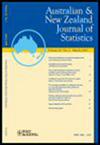具有缺失响应和零舍入的纵向收入数据共享参数混合模型
IF 0.8
4区 数学
Q3 STATISTICS & PROBABILITY
引用次数: 0
摘要
由于几个原因,纵向收入数据的分析往往具有挑战性。例如,在澳大利亚一项关于长期收入的全国性调查中,有很大比例的回答是缺失的,人们认为缺失机制是不可忽视的。此外,还有大量报告的零收入,其中一些可能是真零(对应于合法不赚取收入的个人),而一些可能是假零(对应于个人选择将其收入四舍五入为零)。本文提出了一种新的用于分析半连续纵向收入数据的共享参数混合(SPM)模型,该模型解决了收入无响应和零舍入的两个挑战。这是通过将个人的潜在收入与缺失概率一起建模并四舍五入到零来实现的,在这种情况下,两种概率都可以随其潜在的非零收入平稳变化。将SPM模型应用于澳大利亚收入调查表明,平均而言,老年女性个人和有长期健康问题的个人赚取收入的可能性要小得多,而50至60岁之间签订定期/长期工作合同的男性个人的收入往往最高。此外,有证据表明,零四舍五入和假设缺失机制的条件下,收入较高和较低的个人更有可能不报告他们的收入。本文章由计算机程序翻译,如有差异,请以英文原文为准。
A shared parameter mixture model for longitudinal income data with missing responses and zero rounding
The analysis of longitudinal income data is often made challenging for several reasons. For example, in a national Australian survey on income over time, a non‐negligible proportion of responses are missing, and it is believed the missingness mechanism is non‐ignorable. Also, there are a large number of reported zero incomes, some of which may be true zeros (corresponding to individuals who legitimately do not earn an income), while some may be false zeros (corresponding to individuals choosing to round their income to zero). We propose a new shared parameter mixture (SPM) model for analysing semi‐continuous longitudinal income data, which addresses the two challenges of income non‐response and zero rounding. This is accomplished by jointly modelling an individual's underlying income together with the probability of missingness and rounding to zero, where both probabilities are permitted to vary in a smooth manner with their underlying non‐zero income. Applying the SPM model to the Australian income survey reveals that on average, older female individuals and individuals with a long‐term health condition are considerably less likely to earn an income, while income tended to be highest for male individuals on fixed‐term/permanent job contracts between ages 50 and 60. Furthermore there is evidence of both zero rounding, and conditional on the assumed missingness mechanism, individuals with incomes at the higher and lower ends are more likely to not report their income.
求助全文
通过发布文献求助,成功后即可免费获取论文全文。
去求助
来源期刊
CiteScore
1.30
自引率
9.10%
发文量
31
审稿时长
>12 weeks
期刊介绍:
The Australian & New Zealand Journal of Statistics is an international journal managed jointly by the Statistical Society of Australia and the New Zealand Statistical Association. Its purpose is to report significant and novel contributions in statistics, ranging across articles on statistical theory, methodology, applications and computing. The journal has a particular focus on statistical techniques that can be readily applied to real-world problems, and on application papers with an Australasian emphasis. Outstanding articles submitted to the journal may be selected as Discussion Papers, to be read at a meeting of either the Statistical Society of Australia or the New Zealand Statistical Association.
The main body of the journal is divided into three sections.
The Theory and Methods Section publishes papers containing original contributions to the theory and methodology of statistics, econometrics and probability, and seeks papers motivated by a real problem and which demonstrate the proposed theory or methodology in that situation. There is a strong preference for papers motivated by, and illustrated with, real data.
The Applications Section publishes papers demonstrating applications of statistical techniques to problems faced by users of statistics in the sciences, government and industry. A particular focus is the application of newly developed statistical methodology to real data and the demonstration of better use of established statistical methodology in an area of application. It seeks to aid teachers of statistics by placing statistical methods in context.
The Statistical Computing Section publishes papers containing new algorithms, code snippets, or software descriptions (for open source software only) which enhance the field through the application of computing. Preference is given to papers featuring publically available code and/or data, and to those motivated by statistical methods for practical problems.

 求助内容:
求助内容: 应助结果提醒方式:
应助结果提醒方式:


